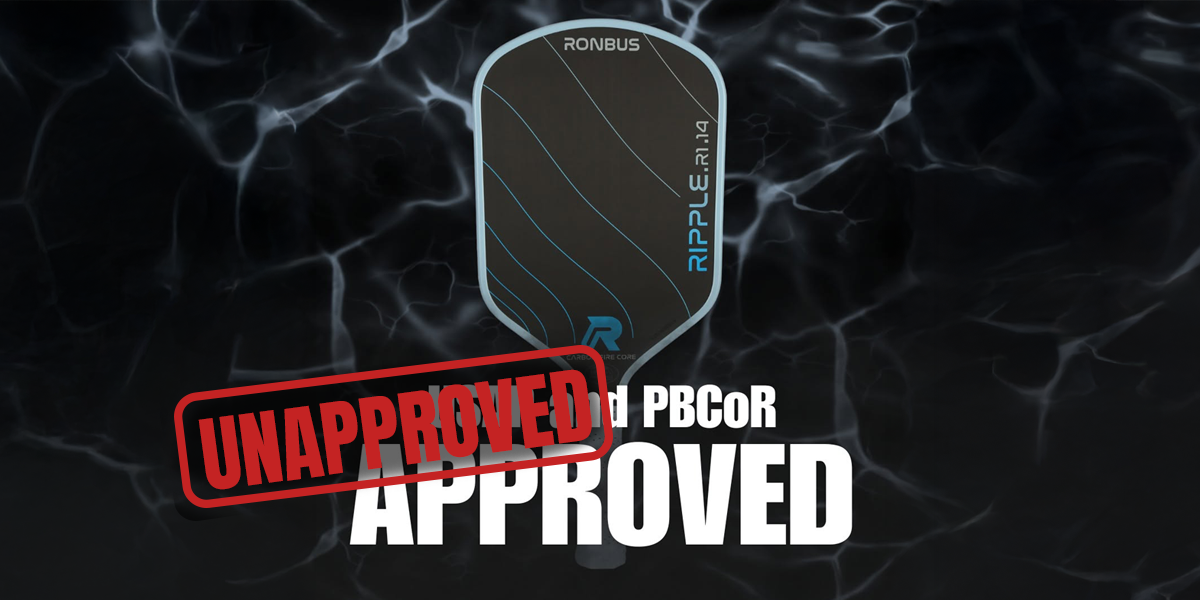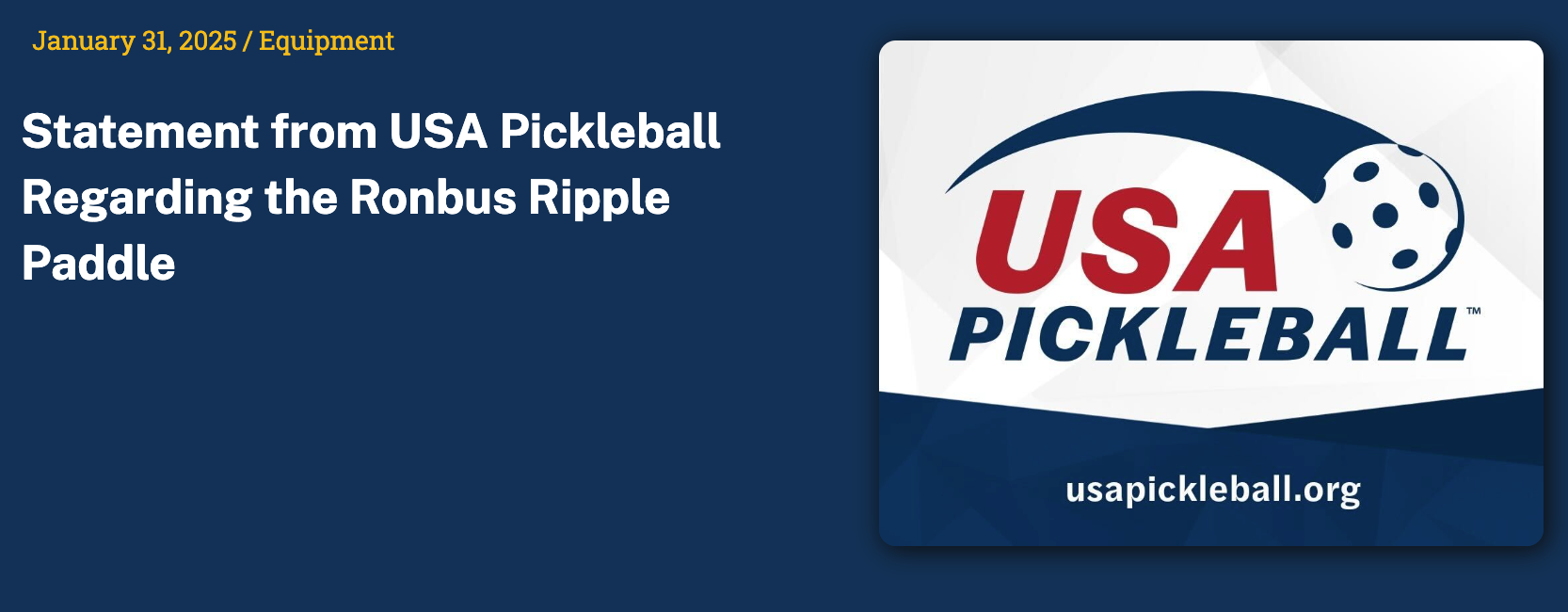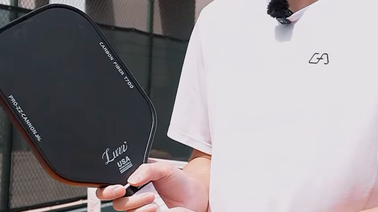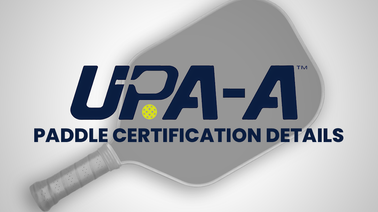
"Put this paddle in the hands of a pro and it will be deadly." That's what paddle expert and YouTuber Jon Kew said about the upcoming Robus Ripple R1.14 on a recent PicklePod episode.
He said the paddle had an amazing sweet spot, spin, dwell time, and power, making it feel more like a tennis racket than a pickleball paddle. But the widely anticipated release has been halted by USA Pickleball in a surprising move that leaves manufacturers scratching their head on where the limits lie in today's testing standards.
The Ripple Effect: Ronbus' Controversial Paddle Shakes Up Pickleball
Originally slated for release on December 6, 2024, the Ripple paddle's launch date became increasingly uncertain as controversies mounted. As of early February 2025, the paddle has yet to hit the market, with no clear indication of when – or if – it will be available to the general public.
The Rise and Fall of the Ripple
When Ronbus announced the Ripple paddle in late 2024, it promised to revolutionize the game with its unique wave-like texture on the hitting surface. The paddle quickly garnered attention from top players and reviewers, who marveled at its power and spin potential.
Zane Navratil, a prominent professional player and equipment reviewer, initially praised the paddle's performance, describing it as having "rocket-like" power.
Controversy Surfaces with the Paddle's Design
As beta versions reached more players, questions arose about the legality of the paddle's distinctive surface. The wave-like texture, while innovative, potentially violated USA Pickleball (USAP) rule 2E2, which regulates surface roughness. This rule is in place to ensure fair play and prevent paddles from imparting excessive spin on the ball.
USA Pickleball issued a statement in the certification, or lack thereof:

USA Pickleball is committed to upholding the integrity of paddle certification through rigorous, standardized testing procedures to ensure fair play and compliance with established performance thresholds.
Regarding the certification status of the Ronbus Ripple.R1.14 PBCoR.43, paddles initially provided for PBCoR testing were beta samples, not final production paddles. USA Pickleball received no production samples for certification until explicitly requested. As a result, the Ripple.R1.14 PBCoR.43 paddle has not been fully certified by USA Pickleball and should not be represented as such.
While Ronbus has conducted internal testing and seeded prototype models with influencers and paddle reviewers, these beta units do not constitute fully certified products. USA Pickleball’s independent testing, conducted in partnership with Element US Space and Defense, revealed that the production paddles submitted for final certification did not pass PBCoR testing.
Reviewers and consumers should be aware that any prototype or pre-certification product should not display the USA Pickleball “Approved” seal unless it has successfully completed the full suite of certification tests.
USA Pickleball remains committed to working with manufacturers to ensure fair and transparent testing protocols. Any paddle seeking full certification must pass all required tests before being officially listed on the USA Pickleball website as an approved product.
Response from Ronbus
Ronbus went on to make significant changes to the Ripple's design. The manufacturer reinforced edge guards and, more critically, flattened the hitting surface to address the legality issues. These modifications however led to new problems. The revised paddle's sound changed dramatically, with many players describing it as reminiscent of a delaminated paddle – a characteristic that raised doubts about its structural integrity.
Power vs. Control
The Ripple paddle's performance has been a double-edged sword. While it offers unprecedented power, many players, including those who tested it for Pickleball Studio, found it increasingly difficult to control over time. The paddle's "hot" face made precise shots and resets challenging, potentially altering the fundamental dynamics of the game.
This power-control imbalance has sparked a broader debate within the pickleball community. Some argue that paddles like the Ripple could push the sport closer to tennis, prioritizing power over the finesse and strategy that many consider central to pickleball's appeal.
"It's like bringing a gun to a knife fight." — Pickleball Studio on the Ripple R1.14
Professional players have been divided on the Ripple paddle. While some, like Zane Navratil, initially praised its performance, others have expressed concerns about its impact on the game. "It's not just about power," said one pro who wished to remain anonymous. "Pickleball is a game of strategy and finesse. We need to be careful not to lose that in the pursuit of more powerful equipment."
Regulatory Limbo
The Ripple's journey has highlighted significant issues with USAP's equipment approval process. The lack of clarity and transparency in paddle testing standards has left manufacturers, players, and consumers in a state of uncertainty.
As of February 2025, there's still no definitive word on whether the revised Ripple paddle will pass USAP testing.

Industry-Wide Implications
The Ripple controversy is not occurring in isolation. It's part of a larger trend that has seen several high-performance paddles removed from USAP's approved list. This phenomenon, dubbed "PaddleGate 2024" by some in the community, has affected multiple brands and caused significant disruption in the pickleball equipment market.
The Ripple saga has put Ronbus in a difficult position. On one hand, they've created a paddle that pushes the boundaries of performance. On the other, they're facing significant regulatory hurdles and potential market rejection. This situation underscores the challenges manufacturers face in balancing innovation with compliance in a sport with evolving standards.
Equipment Arms Race
The Ripple controversy has intensified discussions about an ongoing "arms race" in pickleball equipment. As manufacturers push the limits of technology, there's growing concern about maintaining a level playing field and preserving the essence of the sport.
Many in the pickleball community are using the Ripple situation as a rallying cry for more transparent and consistent equipment regulations. There's a growing consensus that USAP needs to provide clearer guidelines and more open communication about its testing processes.
What's Next for the Ripple?
As of February 2025, the future of the Ronbus Ripple paddle remains uncertain. Influential voices in pickleball are urging caution, advising potential buyers to wait for more clarity on the paddle's legal status and long-term durability before making a purchase.
It's clear that the decision fuels a debate that extends far beyond a single piece of equipment. The controversy has sparked important conversations about the direction of pickleball, the role of technology in the sport, and the need for more robust governance.
Whether the Ripple ultimately makes it to market or not, its legacy may be in forcing the pickleball community to grapple with fundamental questions about innovation, fairness, and the very nature of the game. As the sport continues to grow and evolve, the ripples from this controversy are likely to be felt for years to come.
In the words of a Pickleball Studio host, "This isn't just about one paddle. It's about the future of our sport." As players, manufacturers, and governing bodies navigate these choppy waters, the pickleball community watches with bated breath, wondering what the next wave of innovation – and controversy – might bring.








